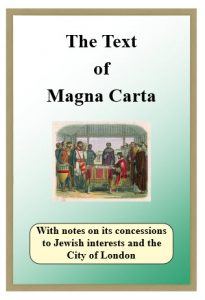As might be expected, the text of the Magna Carta of 1215 bears many traces of haste, and is clearly the product of much bargaining and many hands. Most of its clauses deal with specific, and often long-standing, grievances rather than with general principles of law. Some of the grievances are self-explanatory: others can be understood only in the context of the feudal society in which they arose. Of a few clauses, the precise meaning is still a matter of argument.
In feudal society, the king’s barons held their lands `in fee’ (feudum) from the king, for an oath to him of loyalty and obedience, and with the obligation to provide him with a fixed number of knights whenever these were required for military service. At first the barons provided the knights by dividing their estates (of which the largest and most important were known as `honours’) into smaller parcels described as `knights’ fees’, which they distributed to tenants able to serve as knights. But by the time of King John it had become more convenient and usual for the obligation for service to be commuted for a cash payment known as `scutage’, and for the revenue so obtained to be used to maintain paid armies.
Besides military service, feudal custom allowed the king to make certain other exactions from his barons. In times of emergency, and on such special occasions as the marriage of his eldest daughter, he could demand from them a financial levy known as an `aid’ (auxilium). When a baron died, he could demand a succession duty or `relief’ (relevium) from the baron’s heir. If there was no heir, or if the succession was disputed, the baron’s lands could be forfeited or `escheated’ to the Crown. If the heir was under age, the king could assume the guardianship of his estates, and enjoy all the profits from them to the extent of despoliation-until the heir came of age. The king had the right, if he chose, to sell such a guardianship to the highest bidder, and to sell the heir himself in marriage for such price as the value of his estates would command. The widows and daughters of barons might also be sold in marriage. With their own tenants, the barons could deal similarly.
